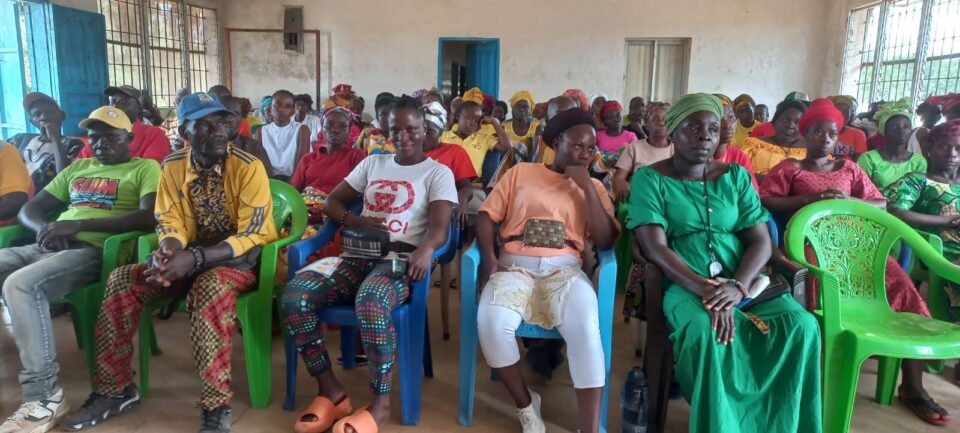PHOTO: Members from the 20 communities seated during the program
By King Brown
GRAND BASSA, Liberia — In a move to improve economic stability and agricultural productivity, twenty local communities in District #4, Grand Bassa County have successfully formed four legally registered cooperatives aimed at fostering economic growth and improving livelihoods through collective savings and investment.
The groups were officially unveiled during a ceremony recently at the Youth Center in Compound #3, marking a significant step toward financial empowerment and community-driven development.
The initiative, led by Community Empowerment for Change (CEC) and supported by Concern Worldwide Liberia, equips members with the tools and knowledge to work together for mutual benefit. These cooperatives are now recognized by the Liberian government and are open to collaborating with potential partners in agriculture and other critical sectors.
Lawson Mingle, Project Officer at CEC said the 20 communities, previously trained and organized by CEC, have been grouped into four clusters for easier management and resource sharing, each now operating as fully-fledged cooperatives:
- Cluster 1: Sorr Town, Mandeh Town, Kennedy Town, and Jogbozhn Town
- Cluster 2: Own Your Own Community, Kissing Community, Crayton Community, Gorgba Community, Gaye Peter Town, and Gbedyu Town
- Cluster 3: Gardee Town, Alex Johnson Town, Teebeh Town, Happyvile Community, Jessie Briggs Town, and MIE Community
- Cluster 4: Guejay Town, Xwizahn Town, Gbozohn Town, and Wredyu Town
He said the cooperatives, which focus on pooling resources for savings and investment, are already making strides toward more sustainable financial management. Mingle noted many members, who previously spent their earnings as soon as they received them, now have a structured way to save and plan for long-term benefits.
“Many of the people expressed their satisfaction with the new system, saying it gives them a way to save and invest wisely, rather than spending their money impulsively, Mingle said. “Before joining the cooperatives, many members noted that they often consumed their earnings immediately. “However, through the training provided by CEC, they now have a better understanding of financial management and how to save for the future”.
Project Officer at CEC, explained that the cooperative model was introduced two years ago to help these communities unite for greater financial independence. The initiative aligns with the government’s push for economic development through cooperative structures.

Empowering Communities for Long-Term Impact, James G. Otto
At the heart of this program is the desire to create lasting change. James Otto, Executive Director of CEC, emphasized that the goal is not merely to save money but to empower communities to invest in meaningful ventures, particularly in agriculture and small businesses.
“We are here to help these communities become self-reliant and create businesses that will benefit everyone,” Otto said. “It’s not just about saving money, but about using those savings to improve lives and strengthen the local economy.” “We want these communities to come together to invest in ventures that will positively impact them and their surrounding areas”.
He said since its founding in 2013, CEC has trained hundreds of local farmers in skills such as snail rearing and cocoa farming. Over 31 farmers in Grand Bassa County are already benefiting from the cocoa farming project, with each farmer managing at least 1000 cocoa trees, Otto noted.
He said the initiative, spearheaded by the Community Empowerment for Change (CEC) and supported by Concern Worldwide Liberia, seeks to create stronger, more resilient communities by fostering collective financial savings and agricultural investment.

Support from the Cooperative Development Agency (CDA), Harris Wennie
The formation of the cooperatives was supported by the Cooperative Development Agency of Liberia (CDA), which played a key role in providing governance and financial management training to the groups. Harris Wennie, Director of Programs at CDA, praised the work of CEC and Concern Worldwide for their role in developing these cooperatives, noting that they are now officially recognized as full-fledged organizations eligible to operate across Liberia.
“These cooperatives have officially met the legal requirements to operate across Liberia”, said Wennie.
Cooperatives, Wennie explained, are crucial to Liberia’s agricultural sector and broader economic development. He highlighted that cooperative development has been a part of the country’s history since 1936, and the government continues to support their growth.
“We are committed to ensuring that these cooperatives can operate efficiently and grow,” said Wennie. “These cooperatives are now equipped to manage resources, form business plans, and invest in projects that will benefit their communities.”
Looking to the Future: Agriculture and Sustainable Development
During the ceremony, Mr. Wennie also urged the cooperatives to consider investing in agriculture, which remains a cornerstone of Liberia’s economy. He encouraged them to explore land acquisition and agricultural projects that could multiply their resources and help drive further growth.
“Cooperatives are critical to the development of any nation,” said Wennie. “They allow people to come together to manage resources, and in Liberia, they have a long history of contributing to agricultural development.”
He said since the 1930s, cooperatives have been an integral part of Liberia’s agricultural sector, with the government recognizing their potential to boost the economy. According to Wennie, the cooperatives in Grand Bassa County are now fully registered and legitimate, and they are eligible to partner with other organizations and government agencies to further their objectives
In his address, Francis Piah, the District Agriculture Officer for Wee Statutory, Grand Bassa County, echoed this sentiment, stressing that the Ministry of Agriculture prioritizes cooperatives for its programs and funding opportunities. He assured the groups that when opportunities arise, they will be connected with the necessary resources to grow their agricultural projects.
Piah urged the cooperatives to use their collective savings to invest in agriculture. “The Ministry of Agriculture often channels its resources through cooperatives, not individuals,” he said. “I encourage you to invest in farm land and agricultural projects that will bring long-term benefits to your communities.”
His comments underscored the government’s emphasis on agricultural development as a key driver of economic growth in Liberia.
Ensuring Financial Accountability
While the cooperatives have made significant strides, financial management remains a key concern. Nyah Duarto, Assistant Registrar of the CDA in Grand Bassa County, urged cooperative leaders to be transparent and accountable with their funds. “The money should be spent with the consent of all members, and the leaders must ensure fairness and openness in managing resources,” Duarto advised.
Local Leaders Express Support
The four cooperatives unveiled at the ceremony include:
- Let Us Unite Credit Union Cooperative Society Ltd (Kennedy Town)
- God Is Able Cooperative (Gaye Peter Town)
- Let Us Fight Credit Union Cooperative (Jessie Briggs Community)
- From Mat to Mattress Cooperative (Xwizahn Town)
The leaders of these cooperatives expressed their gratitude for the training and support provided by CEC and Concern Worldwide. Matthew Joe, Daniel Jaycee, Clarence Tarr, and Nelson Tanwin, heads of the respective cooperatives, all pledged to use the knowledge they’ve gained to benefit their communities.
“We are committed to using our resources to make a positive impact, particularly in agriculture and snail rearing,” said Nelson Tanwin, leader of the Let Us Unite Credit Union Cooperative Society Ltd.
According to them, before the formation of these cooperatives, many of them spent their money as soon as they earned it. However, the new initiative is teaching them the importance of saving and investing in long-term projects.
“This is a huge change for us,” said Matthew Joe, one of the cooperative members. “We now have a chance to save and plan for our future. With the help of CEC, we can now invest our money in something that will truly benefit us.”
A Unified Effort for Local Development
The ceremony was well attended by district commissioners, city mayors, religious leaders, community elders, and residents. The event underscored the growing support for the cooperative model, which is increasingly seen as a path toward sustainable development in rural Liberia.
The establishment of these cooperatives marks a significant milestone in the region’s economic development, with the potential for broader impact across Grand Bassa County and beyond. Through collective action, the 20 communities now have a stronger foundation to pursue opportunities that will enhance their quality of life and contribute to Liberia’s overall growth.
With these new cooperatives in place, the communities of District 4 are now better equipped to work together for their collective prosperity, backed by government and NGO support.

